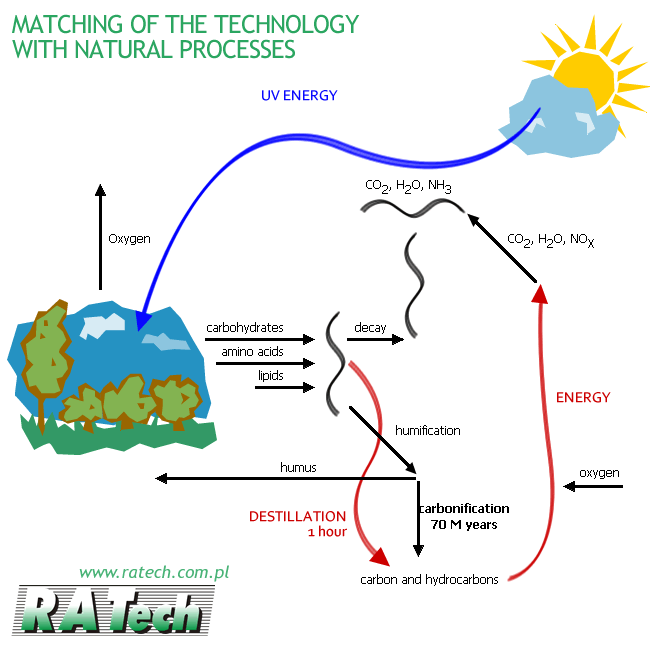DESCRIPTION OF THE TECHNOLOGY
Schematic of RATech’s technology for municipal waste and biomass

Processing of polyolefin plastics and polystyrene into fractioned liquid fuels
Processing of PET bottles
- Processing of municipal waste into energetic gas and syngas using RATech’s dry distillation method
- Processing of polyolefin plastics and polystyrene into fractioned liquid fuels
- PET bottle processing
The technology offered involves the thermal decomposition of organic substances contained in non-segregated municipal waste and various types of industrial waste in a reduction atmosphere, conducted in a special device with membrane heating in temperatures of below 600oC. All metal items contained in the waste are recovered in the process and are split into ferrous and coloured metals, while mineral components are extracted in the form of vitrified granulate. Sewage sediment and any biomass may be processed. The quantity of secondary waste for final depositing is less than 0.5%.
An individual line has a capacity of 45,000 Mg per year, while the minimum load is 25,000 Mg per year. In Poland, this means servicing an agglomeration of 80 - 160 k inhabitants. Multiple systems are used in large cities.
The system requires cooperation with a customer of the gas produced. This can be a heat generation or co-generation station, a ceramics plant, a lime kiln, a large greenhouse complex, a drying plant, a fertiliser factory, a synthetic fuel production plant, a refinery etc.
The floor space required for one line is 3,500 m2; each successive line requires +1500 m2.
Construction time from the handover of the construction site - 18 months, including commissioning.
Profitability in Polish conditions approx. 18% - 24%
An individual line has a capacity of 45,000 Mg per year, while the minimum load is 25,000 Mg per year. In Poland, this means servicing an agglomeration of 80 - 160 k inhabitants. Multiple systems are used in large cities.
The system requires cooperation with a customer of the gas produced. This can be a heat generation or co-generation station, a ceramics plant, a lime kiln, a large greenhouse complex, a drying plant, a fertiliser factory, a synthetic fuel production plant, a refinery etc.
The floor space required for one line is 3,500 m2; each successive line requires +1500 m2.
Construction time from the handover of the construction site - 18 months, including commissioning.
Profitability in Polish conditions approx. 18% - 24%
Schematic of RATech’s technology for municipal waste and biomass

Processing of polyolefin plastics and polystyrene into fractioned liquid fuels
The technology offered involves the thermocatalytic decomposition of waste from PE, PP, PS plastics and their copolymers into a form of liquid fuels released in the form of a petrol fraction, a kerosene fraction and a heating oil fraction. The use of a unique system of heat transfer into the area of the reaction, the specific catalyst reducing the content of heavy paraffin and the fractioned condensate system enables a production line with a processing capacity of up to 6 k Mg per year of plastic waste to be installed in a hall of a floor space of 20 x 20 m.
Such a processing plant enables the receipt of more than 5 k Mg per year of zero-sulphur liquid fuels. The system also produces a certain quantity of flammable gas used for supplying internal operational needs.
The environmental impact is negligible; emissions into the air are the same as from a 600 kW boiler fuelled with LPG.
The system does not produce any sewage.
Construction time 12 months.
Such a processing plant enables the receipt of more than 5 k Mg per year of zero-sulphur liquid fuels. The system also produces a certain quantity of flammable gas used for supplying internal operational needs.
The environmental impact is negligible; emissions into the air are the same as from a 600 kW boiler fuelled with LPG.
The system does not produce any sewage.
Construction time 12 months.
Processing of PET bottles
The technology involves the chemical processing of ground PET bottles in whole into the raw materials from which they were produced, namely ethylene glycol and terephthalic acid. The by-product is high purity phosphate or potassium or sodium sulphate. All these products have a demand on the market and a good price. The technology is a rare example of almost zero-waste production, because no more than 2 kg of solid waste is produced from every 1000 kg of PET raw material in the form of paper cuttings from the labels and polyethylene from the caps which can be completely recycled.
The system does not produce sewage and does not give off gasses. It requires the cooperation of a 900 kW boiler house.
The floor space required for the system is approx. 800 m2 of a hall with a roof. The same amount again is required for storing the large volume raw material and the solid product, namely terephthalic acid and potassium salt.
System capacity 5000 Mg per year of PET waste.
Construction time 12 months.
The system does not produce sewage and does not give off gasses. It requires the cooperation of a 900 kW boiler house.
The floor space required for the system is approx. 800 m2 of a hall with a roof. The same amount again is required for storing the large volume raw material and the solid product, namely terephthalic acid and potassium salt.
System capacity 5000 Mg per year of PET waste.
Construction time 12 months.



